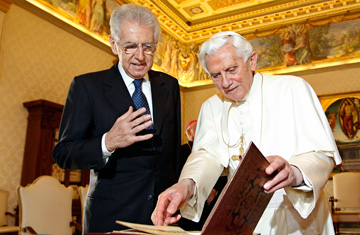
Pope Benedict XVI (right) exchanges gifts with Italian Prime Minister Mario Monti during an official visit at the Vatican, on January 14, 2012
Much of the coverage of a controversial new law winding its way through the Italian Parliament has portrayed the measure as a Nixon-to-China moment. It takes somebody like Prime Minister Mario Monti, the thinking goes, who is not only a practicing Catholic but also a graduate of a Jesuit school, to take on the Catholic Church in Italy and make it pay taxes on its commercial property.
In truth, however, the proposed law would do very little to change the existing legal situation. While the current legislation is muddled in many ways, one thing is clear: religious organizations have been required to pay taxes on property used for commercial purposes since at least 2005, when the country's high court issued a ruling to that effect. The problem is that with the law currently on the books, it's not always clear what is and what isn't a commercial property. Monti's proposal doesn't upend the status quo — it merely reinforces it, cleaning up the legislative language and eliminating gray areas. "It's not a new law," says Marco Tarquinio, the editor of Avvenire, a daily newspaper owned by the Catholics Bishop's Conference. "It's a clarification of law that already existed."
The controversy has generated a great deal of smoke, with various estimates in the media saying the church currently receives between $130 million and $800 million per year in property-tax exemptions. But for all the debate, it's difficult to find areas of substance where the two sides disagree. Nobody, for instance, is suggesting the church pay property tax on its houses of worship. The vast majority of the discussion has centered on religious properties also being used to turn a profit — a convent, for instance, in which an order of nuns has opened a guesthouse for tourists. "It's not who the building belongs to that's important," says Maurizio Turco, a parliamentarian from the small Radical Party, which has long campaigned for tighter taxation on the Catholic Church. "It's what's being done inside the building."
And yet, in a country where all segments of society are feeling the pinch from a moribund economy and harsh austerity measures, few are ready to argue that the church shouldn't contribute. "If there are convents that run hotels and they're not paying taxes, then they're evading," says Tarquinio. "And they should be punished."
Under Monti's proposal, the Catholic Church would continue to be required to pay taxes on property it uses for profitable activity. The nunneries turned hoteliers would be subject to the same levies as the hotel next door. In cases where the use is mixed — a building containing, say, a chapel, a floor where nuns live and a couple of floors with rooms on offer to tourists — only the part dedicated to commercial activity would be subject to the tax. Buildings dedicated for religious use or that house nonprofit activities, such as schools, hospitals and homes for the elderly, would remain exempt.
To the extent there is a substantive disagreement, it's over the last point. The Radical Party plans to vote against Monti's proposal on the grounds it doesn't go far enough. In a country where enforcement is already lax, many worry such exemptions would leave loopholes large enough to drive a camel through and, in any case, continue to give privileges to church-run schools and hospitals not enjoyed by their private competitors. The church's defenders respond that without the property-tax exemption, hundreds of small private schools and charities could be driven to collapse. "These are public services being run by private institutions," says Gianluca Vignola, who is in charge of managing Italy's Jesuit schools. "This an ideological discussion, not a practical one."
There's one place where the law, which would apply to all nonprofit organizations, not just the Catholic Church, could make a difference. Entities that purport to be tax exempt would be required to declare what portions of their buildings are being used commercially, providing the state for the first time with a list its agents can check. That kind of transparency is something nobody can object to.
